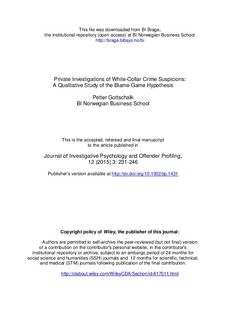| dc.contributor.author | Gottschalk, Petter | |
| dc.date.accessioned | 2016-07-01T14:19:31Z | |
| dc.date.available | 2016-07-01T14:19:31Z | |
| dc.date.issued | 2015 | |
| dc.identifier.citation | Journal of Investigative Psychology and Offender Profiling, 12 (2015) 3: 231-246 | nb_NO |
| dc.identifier.issn | 1544-4767 | |
| dc.identifier.uri | http://hdl.handle.net/11250/2395358 | |
| dc.description | This is the accepted, refereed and final manuscript
to the article. | nb_NO |
| dc.description.abstract | The activity of private investigations by fraud examiners is a business of lawyers, auditors and other professionals who investigate suspicions of financial crime by white-collar criminals. This article presents results from an empirical study of investigation reports. The available sample consists of 28 reports written mostly by auditing firms such as Deloitte, Ernst & Young and PwC. The blame game can occurs at two stages in a private investigation. First, the mandate formulated by a client may point investigators in a specific direction. Next, investigators sometimes suffer from a tunnel view of predetermined opinions. In the sample of 28 investigations reports, more than half of them involve potential blame game victims. | nb_NO |
| dc.language.iso | eng | nb_NO |
| dc.publisher | Wiley | nb_NO |
| dc.title | Private Investigations of White-Collar Crime Suspicions: A Qualitative Study of the Blame Game Hypothesis | nb_NO |
| dc.type | Journal article | nb_NO |
| dc.type | Peer reviewed | nb_NO |
| dc.source.journal | Journal of Investigative Psychology and Offender Profiling | nb_NO |
| dc.identifier.doi | 10.1002/jip.1431 | |
| dc.description.localcode | 1, Forfatterversjon | nb_NO |
